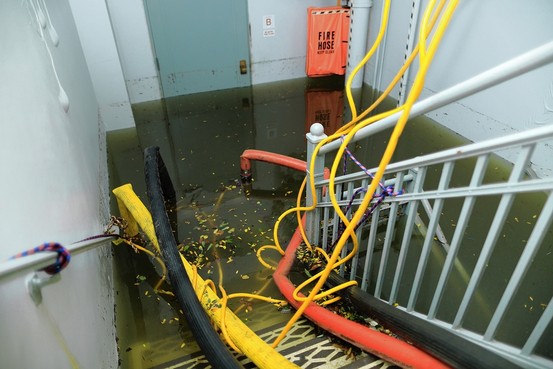Eleven years after the 9/11 terrorist attacks, Verizon Communications Inc. is once again scrambling to repair severe damage to a key switching facility inside its historic headquarters building in lower Manhattan.
The massive facility for interconnecting key communications lines sustained heavy damage after planes struck the Twin Towers more than a decade ago. This time the enemy was water shoved ashore by Hurricane Sandy.
The building is one of the worst hit of a number of facilities that carriers were rushing to fix Wednesday. The Federal Communications Commission said the number of cellphone tower outages dropped on the second day after the storm made landfall, with just over a fifth of the sites in storm-affected areas in the Northeast offline, down from about a quarter on Tuesday.
Phone companies supplemented those efforts with extraordinary measures to bolster service. Wireless carriers AT&T Inc. and T-Mobile USA, for example, said they would switch each others’ customers between their networks depending on which was in better shape in a particular area.
The steps came as cellphone users around the New York City area reported more trouble keeping and completing calls as businesses started to open back up and people tried to go about their workdays. The FCC said pockets of serious damage remain that will take a long time to repair.
The depth of the challenges facing telecom providers was on display inside Verizon’s facilities in lower Manhattan.
The company’s headquarters—a key communications hub just north of the World Trade Center site at 140 West Street—was in a state of crisis not seen since the 9/11 attacks, which partially destroyed the building.
Mud still covered parts of the ornate lobby. Down below, 3½ floors of the building’s five-level basement were still submerged, the brackish water sloshing up the walls of the stairwell.
Verizon employees said Monday night’s storm surge was so powerful that it breached the protective plugs that surround cables coming into the building. As a result, water flooded the critical basement “cable vault” that takes in communications cables and directs them to switching gear upstairs, which wasn’t damaged. On Wednesday, Verizon employees took a reporter inside the vault, illuminating the huge dark room with flashlights. The cables were still damp, and leaves littered the floor.
At another Verizon switching facility downtown, on Broad Street, the situation was even worse. Water had flooded critical electrical equipment, leaving the entire building inoperable.
“There is nothing working here,” said Mr. Melone. “Quite frankly, this is wider than the impacts of 9/11.”
Telecom hubs like Verizon’s flooded buildings downtown act as collecting points for phone and data traffic, serving as key “nodes” in the phone network. Mr. Melone said that area landline customers, cellphone users, and businesses like the New York Stock Exchange were served by Verizon’s hubs downtown.
Verizon said it had built in enough redundancy to be able to operate its network in a limited way. Mr. Melone said it was still able to provide service to the stock exchange on Wednesday, and that cellphone service was improving.
Outside the Broad Street facility, water being pumped out of the basement was rushing down the street as Verizon executives, including Mr. Melone and Verizon CEO Lowell McAdam, oversaw the efforts of scores of workers. The entrance to the darkened building was held open with a sandbag.
At 140 West, Mr. Veltri and other Verizon officials had to take unusual measures. Mr. Veltri said no one expected the water to flood as much of the building as it did. The force of the storm surge was so strong that it bent the 86-year-old Art Deco skyscraper’s steel and bronze doors. To pump out the water, workers stuck a pipe down an elevator shaft.
Via: WSJ













